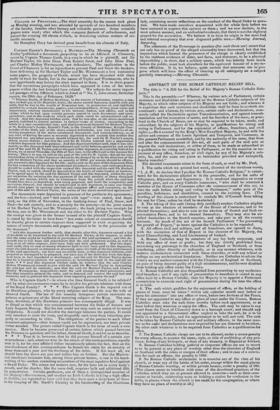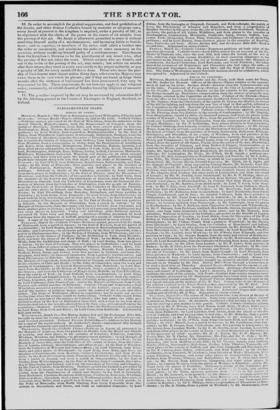ABSTRACT OF THE ROMAN CATHOLIC RELIEF BILL.
The title is "A Bill for the Relief of his Majesty's Roman Catholic Sub- jects." This is the preamble :—" Whereas, by various acts of Parliament, certain restraints and disabilities are imposed on the Roman Catholic subjects of his Majesty, to which other subjects of his Majesty are not liable; and whereas it is expedient that such restraints and disabilities shall be from henceforth dis- continued: and whereas, by various acts, certain oaths and declarations, com- monly called the Declaration against Transubstantiation, and against transub- stantiation and the invocation of saints, and the Sacrifice of the mass, as prac- tised in the Church of Rome, are or may be required to be taken, made, and subscribed, by the subjects of his Majesty, as qualifications for sitting and voting in Parliament, and for the enjoyment of offices, franchises, and civil rights ;--Be it enacted by the King's Most Excellent Majesty, by and with the advice and consent of the Lords Spiritual and Temporal, and Commons, in this present Parliament assembled, and by the authority of the same, that from and after the commencement of this act, all such parts of the said acts as require the said declarations, or either of them, to be made or subscribed as a qualification for sitting and voting in Parliament, or for the exercise or en- joyment of any office, franchise, or civil right, by arty of his Majesty's sub- jects, be, and the same are (save as hereinafter provided and excepted), hereby repealed." The detailed enactments relate to the form of oath, as read by Mr. Peel, 1. The oaths which we printed last week, divested of the invidious words,
"I, A. B., do declare that I profess the Roman Catholic Religion," is substi- tuted for the declarations alluded to in the preamble, and for the oaths of
Allegiance, Abjuration, and Supremacy. It is rendered imperative on every
Catholic peer, and on every Catholic commoner, " who shall be returned a member of the House of Commons after the commencement of this act, to
take the oath before sitting and voting in Parliament," under pain of the penalties, forfeitures, and disabilities, created by the existing laws. (The wording of this clause is understood to exclude Mr. O'Connell from taking his seat for Clare, unless he shall be re-elected.) 2. The taking of this oath (being duly certified) renders Catholics eligible to vote at the election of members of the House of Commons, and to be
elected themselves; and also to vote at the election of Scotch And Irish re- presentative Peers, and to be elected themselves. They in also be en- rolled freeholders in the Scotch counties, and take part n all the county business. So much of the act of the Scotch Parliament " for preventing the growth of Popery," as bears against the Catholics is to be repealed.
3. All offices civil and military, and all franchises, are opened to them, with the exception of that of Regent in the absence of his Majesty, the Lord Chancellorship, and Lord Lieutenancy of Ireland. 4. Roman Catholics may be members of any lay body corporate, and hold any office of trust or profit; but they are strictly prohibited from exercising any patronage in the churches of England or Scotland, or from interfering, either directly or indirectly, or in any manner whatever, with matters ecclesiastical connected with these churches, or with any school or college on any ecclesiastical foundation. Neither are Catholics to advise the Crown on any matters connected with the Churches of England or Scotland, on pain of being deemed guilty of a high misdemeanour, and for ever disabled from holding any office tinder the Crown. 5. Roman Catholics are also disqualified from presenting to any ecclesias- tical benefice ; and if any right of presentation to benefices is vested in any office held by a Roman Catholic, then his Majesty is to appoint a Protestant commission to exercise such right of presentation during the time the office is so held.
6. The oath which qualifies for the enjoyment of office, or the holding of places of trust, must be taken " within one calendar month next before or upon his admission" into any office or trust, before two Justices of the Peace. If they are appointed to any office or place of trust under the Crown, Roman Catholics must take the oath three months before such appointment, or at least before they exercise or enjoy the office. The oath may be taken in any court from the Court of Chancery down to a borough court; and should any one appointed to a Government office neglect to take the oath, be is to be liable to a heavy penalty, and the appointment to be null and void. The oath to be taken by Roman Catholic naval and military officers, in the same man- ner as the oaths and declarations now required by law are directed to be taken. No other oath whatever is to be required front Catholics as a qualification for office.
7. The Roman Catholic clergy are not to be allowed, under a severe penalty for every offence, to assume the name, style, or title of archbishop of any pro- vince, bishop of any bishopric, or dean of any deanery, in England or Ireland.
8. Roman Catholics holding judicial or corporate offices are not to resort to or be present at any place of worship other than the churches of England or Scotland with the robes or ensigns of their offices; and in case of a convic- tion for such an offence, the penalty is 1001. 9. No Roman Catholic ecclesiastic is to exercise any of the rites of his church, or wear any of the habits of his order, except within the usual places of Roman Catholic worship, or within private houses, under a penalty of 501. (This clause seems to interfere with some of the devotional practices of the Catholics which they are at present allowed to exercise—such as their cere- monies at burials, celebrating mass or holding a station for confession in the fields, in places where the church is too small for the congregation, or where they have no place of worship at all.)
- 10. In order to accomplish the gradual suppression, and final prohibition of the Jesuits, and other Roman Catholics bound by monastic or religious vows, every Jesuit at present in the kingdom is required, under a penalty of 501., to be registered with the clerks of the peace in the course of six months from the passing of this act. • No Jesuit is afterwards permitted to enter it without rendering himself guilty of a misdemeanour, and becoming liable to banish- ment; and no superior, or members of the order, shall admit a brother into the order or community, and administer the oaths or vows necessary on the occasion, without rendering himself guilty of a misdemeanour. Banishment from the kingdom is likewise to be the punishment of any Jesuit who, after the passing of this act, takes the vows. British subjects who are Jesuits, and out of the realm at the passing of the act, may return ; but within six months after their return, they must in every case certify to the proper authority, or pay a penalty of 50/. for every month till this is done. Those who incur the pen- alty of banishment must depart within thirty days, otherwise his Majesty may cause them to be sent where he pleases ; and if they are found at large three months after the sentence of banishment has been pronounced, they may be transported for life. These enactments do not however apply to any religious order, community, or establishment of females bound by religious or monastic vows.
11. The penalties imposed by the act may be recovered by information filed by the Attorney-general in- the Courts of Exchequer in England, Scotland, or Ireland.

















 Previous page
Previous page